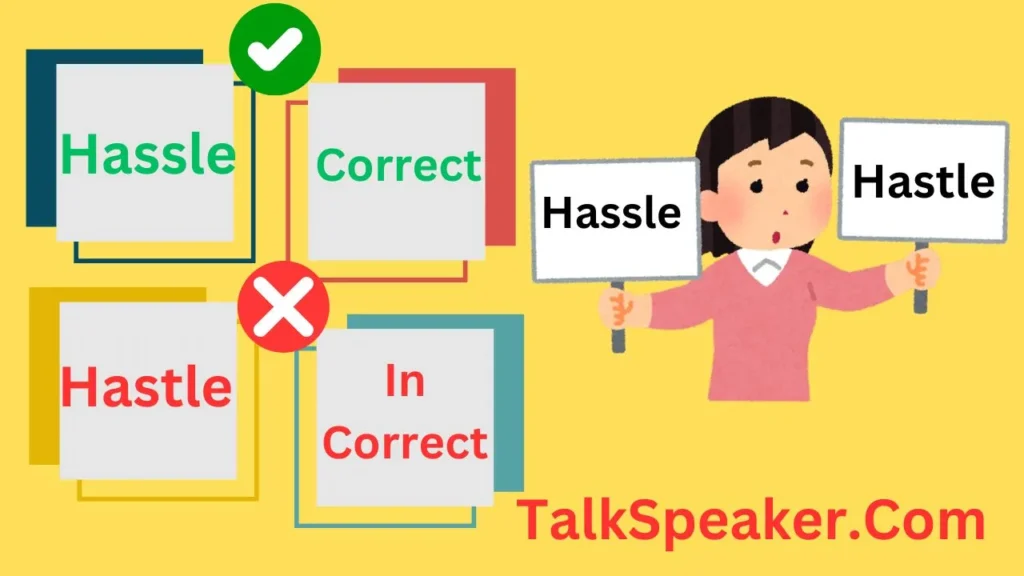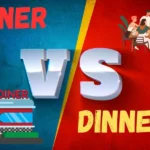Last updated on November 7th, 2024 at 06:18 am
Have you ever stumbled upon the words “hassle” and “hastle” and wondered which is correct? If so, you’re not alone. Many people get confused about the spelling of “hassle,” mistakenly using “hastle” instead.
This confusion isn’t just a minor quirk of the English language; it has real implications for clear communication.
The correct spelling is “hassle,” while “hastle” is a common misspelling that should be avoided.
In this article, we’ll unravel the mystery behind “hassle” versus “hastle,” exploring the correct spelling, its usage, and the historical roots that contribute to this common mix-up.
Hastle vs Hassle Quick Difference

| Correct Version | Incorrect Version | Example Sentence |
|---|---|---|
| hassle | hastle | “Dealing with traffic every day is such a hassle.” |
| hassle | hastle | “I had to hassle with customer support to get a refund.” |
| hassle | hastle | “Filling out endless paperwork is a real hassle.” |
| hassle | hastle | “The hassle of moving to a new house can be overwhelming.” |
The Definition of Hassle in Different Contexts

As a Verb: The Act of Hassling
When used as a verb, hassle means to repeatedly bother or harass someone. For example:
- “The salesman hassled me until I finally agreed to buy the product.”
In this context, “hassling” involves persistent annoyance or pressure.
As a Noun: The Concept of a Hassle
As a noun, hassle represents a situation that is troublesome or inconvenient:
- “Dealing with traffic during rush hour is a real hassle.”
Here, “hassle” describes a scenario that causes stress or difficulty.
Common Usage of the Word ‘Hassle’ in Sentences
To clarify how “hassle” is used, consider these sentences:
- “Finding parking in the city can be a hassle.”
- “The process of renewing my passport was a hassle.”
In these examples, “hassle” highlights everyday challenges that can be frustrating.
Etymology: Tracing the Origin of ‘Hassle’
The term hassle has a somewhat uncertain origin, but it is believed to have entered English in the late 19th century.
Its exact roots are debated, but it’s likely derived from the earlier use of the word “hass,” which means to harass or trouble.
Hassle has evolved from its initial use to become a more general term for any troublesome situation.
Common Meanings and Usage
Hassle can refer to:
- Minor annoyances: Everyday irritations like a long wait or a complicated form.
- Major difficulties: Significant challenges such as dealing with bureaucratic red tape.
Examples of Meanings
- Minor Annoyance:
- “The paperwork for the new job was a hassle.”
- Major Difficulty:
- “The hassle of moving to a new city can be overwhelming.”
Why the Confusion? Exploring the Spelling Challenges with ‘Hassle’
The confusion between hassle and “hastle” often arises from how the words sound. Phonetically, “hassle” with its soft “s” might lead some to incorrectly think it should be spelled “hastle.”
The “s” sound in “hassle” is pronounced similarly to “sh,” which doesn’t translate directly to the spelling.
Spelling Challenges:
- Phonetic Misinterpretation: The sound of “hassle” might be misheard as “hastle.”
- Similar Words: The presence of other similar-sounding words like “castle” and “hustle” can add to the confusion.
Tips to Remember the Correct Spelling: ‘Hassle’
To avoid mixing up hassle with “hastle,” consider these memory aids:
- Mnemonic Device: Think of the word “hassle” as related to “struggle” and remember it has two “s”s, like the double trouble of dealing with a hassle.
- Visual Aid: Imagine the word “hassle” with two “s” shapes to remind you of the correct spelling.
‘Hassle’ in Popular Culture and Examples
Hassle appears in various forms of popular culture, reflecting its usage and significance:
- Movies and TV Shows: The term is often used to describe bureaucratic red tape or personal struggles.
- Music and Lyrics: Songs and lyrics sometimes use “hassle” to convey frustration or difficulties.
Examples in Popular Culture
- Movies:
- In the film “Office Space”, the main character deals with a series of workplace hassles.
- Music:
- Lyrics in the song “Don’t Let the Hassles Get You Down” highlight the emotional impact of dealing with hassles.
Using ‘Hassle’ in Literature
In literature, hassle can be found in various contexts, illustrating its impact on characters and plots:
- Novels: Characters often encounter hassles that drive the story or illustrate themes of perseverance.
- Short Stories: Hassles in short stories can highlight personal challenges or societal critiques.
Literary Examples
- Novels:
- In “Catch-22” by Joseph Heller, characters face numerous bureaucratic hassles that add to the absurdity of war.
- Short Stories:
- In “The Lottery” by Shirley Jackson, the concept of a “hassle” reflects societal issues and personal conflict.
Real-life Examples: When ‘Hassle’ Becomes Tumultuous
Real-life examples of hassle illustrate its tangible impact:
- Administrative Hassles: Navigating complex forms or regulations can be overwhelming.
- Personal Hassles: Everyday annoyances like delays or misunderstandings can cause significant stress.
Case Studies
- Administrative Hassles:
- An individual applying for a visa might face numerous hassles involving paperwork and approvals.
- Personal Hassles:
- A consumer dealing with a faulty product might encounter a hassle in getting a refund or replacement.
Public Demand:
1. Is it “hassle” or “hastle”?
Answer: “Hassle” is the correct spelling; “hastle” is a common misspelling.
2. What does “hassle” mean?
Answer: “Hassle” refers to an annoyance, difficulty, or minor trouble, and it can also mean to bother or harass someone.
3. Why do people confuse “hassle” with “hastle”?
Answer: The confusion often arises from phonetic similarities, as “hassle” is pronounced with a soft “s” sound, which some might misinterpret as “hastle.”
4. Can “hassle” be used as both a noun and a verb?
Answer: Yes, “hassle” can describe a bothersome situation (noun) or the act of bothering someone (verb).
5. Are there similar words to “hassle”?
Answer: Yes, words like “struggle,” “burden,” and “inconvenience” have related meanings to “hassle.”
6. How can I remember the correct spelling of “hassle”?
Answer: Think of the word “struggle” and remember that “hassle” has two “s” letters, symbolizing “double trouble.”
Conclusion
Understanding the difference between “hassle” and “hastle” is crucial for clear and effective communication.
The correct spelling, hassle, has a rich history and is used to describe both minor annoyances and major difficulties.
By following the tips provided and recognizing the common pitfalls, you can avoid the confusion and use the term correctly in your writing and daily interactions.

Sophie Mitchell, a seasoned English educator, brings her passion for language and years of teaching expertise to TalkSpeaker. With a knack for simplifying grammar and expanding vocabulary, she empowers learners to master English with confidence.




